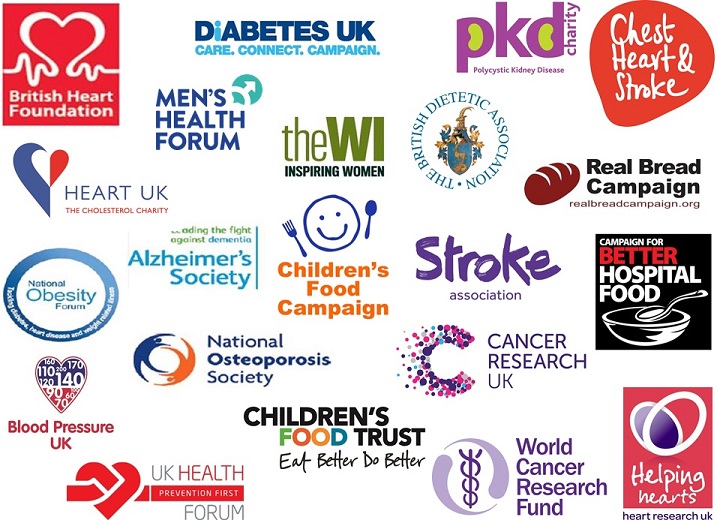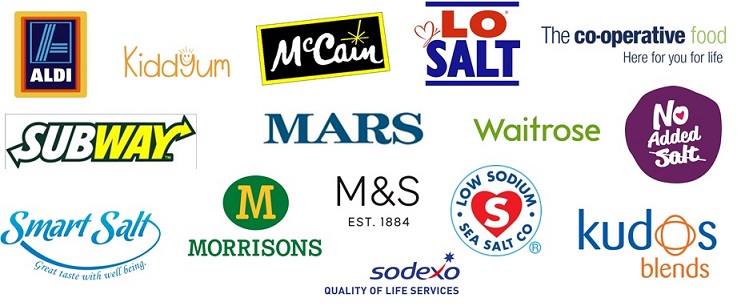Supporters
Each year CASH is fortunate to have support from a number of leading health charities, health professionals, chefs and celebrities, highlighting the importance of following a low salt diet.
This year we are supported by:
Charity Supporters

British Heart Foundation
“The British Heart Foundation (BHF) is pleased to be supporting National Salt Awareness Week 2015. Eating too much salt is linked to raised blood pressure, a risk factor for coronary heart disease which kills around 73,000 people every year in the UK. We know that both adults and children in the UK are eating more salt than is recommended on average. That’s why the BHF is committed to educating the public about the heart health impact of salt and ways they can reduce their intakes. We are also calling on the food industry to reformulate products to reduce salt content and use colour coded front-of-pack nutritional labelling to offer consumers healthier options and arm them with the information they need to make heart healthy choices.”
British Dietetic Association
Eating too much salt increases the risk of developing high blood pressure (hypertension), which is a major risk factor for heart disease, kidney disease and stroke. By reducing your salt intake it is possible to reduce your blood pressure and the health problems it causes, so it’s well worth doing. The British Dietetic Association is supporting Salt Awareness Week because we think it is important to highlight the impact of consuming too much salt.
Stroke Association
Nikki Hill, Deputy Director of External Affairs at the Stroke Association, said: "A healthy diet that’s low in salt is good for you at any stage of your life, but it’s particularly important that children have a healthy start when it comes to balanced meals. Salt can have harmful effect on our health, and consuming too much can lead to high blood pressure; one of the biggest risk factors for stroke in adulthood. As a result of this campaign, we hope as many families as possible are able to monitor the salt content in their meals."
Polycistic Kidney Disease Charity
The PKD Charity strongly supports Salt Awareness Week. Children with PKD - polycystic kidney disease - have a very high risk of developing hypertension at an early age, resulting in increased risk of life-threatening heart disease and stroke. These vulnerable children should not be subjected to added risk from the high levels of sodium/salt found in so-called 'family-friendly' restaurants. We would like to see a significant reduction of sodium in restaurant meals and legible labelling to help parents make healthy choices for their children when eating out.
Northern Ireland Chest Heart & Stroke
"Too much salt in your diet can increase your blood pressure which can cause heart attack or stroke. That’s why it is so important to be aware of how much salt is in your diet.
National Federation of Women's Institutes
Throughout its history, the NFWI has been campaigning to improve the nation’s diet and health. In recent years, this concern has particularly focused on the decline of practical food skills throughout the population, and the increasing health risks associated with our over reliance on processed foods, which are generally high in salt. The NFWI believes that it is vitally important to educate the public on the dangers of consuming too much salt to ensure the health of the nation.
Heart Research UK
Heart Research UK wholeheartedly supports this campaign to reduce salt in foods, particularly those which are consumed in high quantities by children or specifically marketed at children. The long-term damage of a high sodium diet starts early in life and, as a liking for salt is an acquired taste, foods with a high salt content should not be encouraged amongst children.
Children's Food Trust
Dr Patricia Mucavele, Head of Nutrition at the Children’s Food Trust, says: “At the moment, children are consuming too much salt and we need to cut that down. This is about protecting their health for the long-term: by not giving children a taste for salty food in the first place, we make them less likely to eat too much salt as adults. Better guidance on food in childcare and standards for school meals are making an important difference to the amount of salt children eat but there’s still lots more we can do at home. Three-quarters of the salt we consume is from everyday foods like bread and breakfast cereal, so checking food labels to find lower-salt options is a great step – try to stick to options that have the green (low) or amber (medium) colour code for salt. Eating out with children is often a prime time for overdoing it on salt so we’re pleased to see National Salt Awareness week raising this issue. We’d like to see even more restaurants looking at salt levels on their children’s menus and making switches where they can - parents consistently tell us they want healthier children’s meals when they eat out as a family, so this is a big way to connect with customers.”
Campaign for Better Hospital Food
“Salt awareness week and the fantastic work of its organisers Consensus Action on Salt and Health remain vital to the continuing efforts to reduce the amount of salt in our food. Nowhere is this more important than in our hospitals where patients and staff need to be served and sold healthy food, rich in nourishment. With hospitals only being asked by government to meet 2012 Responsibility Deal targets for salt and saturated fat rather than 2017 targets, the healthiness of hospital food continues to fall behind that sold in our supermarkets and high street restaurants. Salt awareness week will certainly help to sharpen focus on this unacceptable situation”
Industry Supporters

Celebrity Supporters
Vicky Bhogal Cookery Author www.vickybhogal.com/blog |
Renee Maguire Top UK Raw Food Chef www.rawchifood.com/about/about-renee/ |
Amanda Ursell Nutritionist & Dietitician www.amandaursell.com |
Azmina Govindji RD MBNA |






